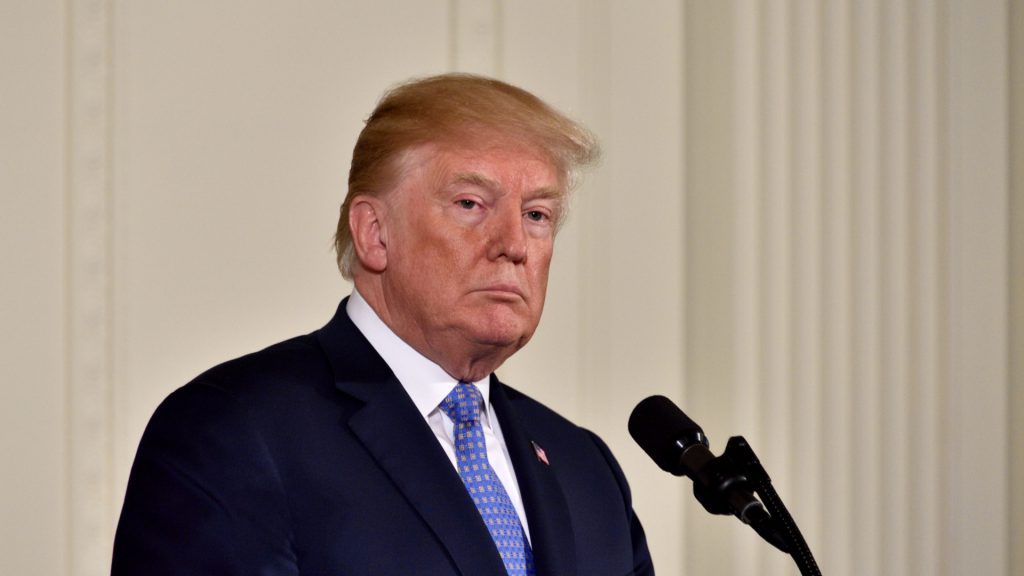
Published December 7, 2020
“We are entering into an epistemological crisis,” Barack Obama recently told my colleague Jeffrey Goldberg.
The crisis didn’t begin with the Trump presidency, but it rapidly accelerated over the course of its term—and the situation has, if anything, grown worse in the aftermath of the presidential election.
According to one poll, 70 percent of Republicans say they don’t believe that the 2020 election was free and fair. According to another, 77 percent of Trump backers say President-elect Joe Biden won because of fraud. And a Reuters/Ipsos poll found that 68 percent of Republicans said they were concerned that the 2020 election was “rigged,” and that only 29 percent believed that Biden had “rightfully won.” More than half of Republicans said Trump “rightfully won” but the election was stolen from him because of widespread voter fraud that favored Biden, claims that are hallucinatory.
This may be Donald Trump’s most enduring legacy—a nihilistic political culture, one that is tribalistic, distrustful, and sometimes delusional, swimming in conspiracy theories. The result is that Americans are disoriented and frustrated, fearful of and often enraged at one another.
Donald Trump didn’t invent misinformation and disinformation; they have been around for much of human history. But Trump—by virtue of his considerable skills in this area, aided by social media and capitalizing on “truth decay” and diminishing trust in sources of factual information—exploited them more effectively than anyone else has in American history.
“It was unthinkable before Trump for anyone to run this kind of disinformation campaign from the White House against the American public,” according to Jonathan Rauch, the author of the forthcoming book The Constitution of Knowledge: A Defense of Truth. As a result, we live in an era defined by epistemic chaos and noetic disarray, one in which a large portion of the population embraces falsehoods and fairy tales and thinks of them as “alternative facts.”
The deceit being dispensed by Trump & Company is hardly universal, but it is extensive, which is why defeating Trump was essential if we’re going to move away from perspectivism as the interpretive theory in our politics. But objective reality as a concept—truth as something that exists independent of affect, independent of subjective narratives, independent of whatever a partisan information silo claims is true—has been badly damaged. Among the most urgent tasks facing America, then, is to strengthen our regard for what Plato called episteme over doxa, true knowledge over opinion, reality over fantasy.
Disinformation flourishes in a profoundly polarized society, which America most certainly is. How to depolarize our society is its own challenge, of course, especially when Americans have been subject to Trump’s relentless disinformation campaign for the past half decade. As president, Biden will turn down the temperature of our politics; any person replacing Trump would. But Biden seems particularly well suited—temperamentally and based on the political culture that shaped him—to calm our politics.
Believing that the toxicity in our politics will quickly and easily be drained would be silly; in fact, in some quarters, things will get worse. (We see this in Trump supporters who are migrating from Fox News to Newsmax and One America News because Fox was deemed insufficiently pro-Trump, as startling as that seems.) But not having a president who wakes up every morning thinking of ways to divide Americans by race, region, and religion, by class and party, will be a move in the right direction.
A former adviser to President Bill Clinton told me that if Biden wants to go beyond that, he should focus on practical issues, such as infrastructure, while avoiding unnecessary fights over issues that inflame people’s emotions.
The new president could take on a conservative cause such as promoting adoption and foster care. Common ground might be possible on policies such as a pandemic stimulus package, indexing the minimum wage to inflation, reducing child poverty with a child allowance, combatting the opioid epidemic, expanding national service, implementing paid family leave, and boosting worker training and apprenticeship programs. On immigration, a deal could probably be struck that involves reinstating DACA (Deferred Action for Childhood Arrivals) and E-Verify. There’s even an opportunity to find common ground on gay rights and religious liberties in the form of the Fairness for All Act.
Another top Clinton adviser, William Galston, recently argued that Biden would be wise not to push for his Justice Department to open investigations into Trump that could lead to his prosecution. Appointing someone to the Biden administration such as former Republican Governor John Kasich, who endorsed Biden in 2020, would be an impressive gesture. The president-elect could also nominate Michael Wear as director of the Office of Faith-Based and Neighborhood Partnerships. Wear, who served in the Obama administration, is trusted by key stakeholders and voices from across the political and religious spectrum in a way that would be of value to the administration.
The Republicans may not reciprocate Biden’s outreach efforts; the early signs are not encouraging. Nevertheless Biden, as president of all the people, should try. It’s part of the job description, and modeling respectful outreach, particularly in this rancorous environment, would be a patriotic act. We need circuit breakers.
But political outreach, even if successful, is hardly enough. The United States won’t reverse what Rauch calls “epistemic secession” until social-media platforms adhere to epistemic standards and norms.
We’ve seen marginal but measurable progress over the past four years, with some of the most popular social-media platforms embracing measures to curb misinformation and increase transparency. For example, Facebook is removing all accounts that represent the QAnon conspiracy theory. Twitter now includes warning labels on misleading tweets, including the president’s. (Twitter has a Civic integrity policy.) YouTube has community guidelines.
“In 2020, the United States did better than in 2016 against pre-election disinformation,” Rauch recently wrote in Persuasion. “Traditional media wised up to manipulators; social media reduced the reach of propaganda; scholars and activists got better at exposing coordinated campaigns; the public grew more sophisticated about fakery. Taken together, those and other countermeasures were an impressive feat of adaptation.”
In our daily lives, seemingly small acts, if enough of us actually perform them, can create the conditions that allow our country to again share a common reality. I have in mind things like venturing outside of our echo chambers to build relationships with people who see the world differently than we do. We can avoid making needlessly provocative comments, including on social-media platforms. And we can all do better at “stepping away from the emotional heat of a conversation,” as one person I know put it.
I’m not a Pollyanna, nor am I under any illusion that deep differences will evaporate because people show courtesy toward one another. I’m saying only that if we have any chance of reconstituting truth in the public arena, then marshaling arguments and emailing fact-checking articles to people with whom we have political differences—and I’ve done both—aren’t enough. There has to be some human connection, some way to reassure others that they’re not under attack, some means to instill confidence that the person you’re arguing with doesn’t hate you and might even care for you. We have to find a way to lay aside, at least for a time, our swords and shields.
One of the essential tasks of this decade, then, is to rebuild trust in one another—and that happens best person-to-person, often at the local level, a conversation at a time, a generous act at a time. We also need to rebuild trust in our institutions, trust that has been mostly declining for decades. But for this to happen, institutions—government, media, the academy, the corporate world, churches—have to act in ways that earn our trust. The more institutions deliver, the more trust we will have, and the more trust we have, the less likely the seeds of paranoia, conspiracies, and subjectivism are to take root, or if they do, the soil will be shallow. But even if trust in one another and our institutions increases and feelings of alienation, apprehension, and isolation decrease, we will still have to navigate a turbulent time. An awful lot of cortisol has been released into our national bloodstream.
“The party told you to reject the evidence of your eyes and ears. It was their final, most essential command,” George Orwell wrote in his masterpiece 1984.
[Winston Smith’s] heart sank as he thought of the enormous power arrayed against him, the ease with which any Party intellectual would overthrow him in debate, the subtle arguments which he would not be able to understand, much less answer. And yet he was in the right! They were wrong and he was right. The obvious, the silly, and the true had got to be defended. Truisms are true, hold on to that! The solid world exists, its laws do not change. Stones are hard, water is wet, objects unsupported fall towards the earth’s center. With the feeling he was speaking to O’Brien, and also that he was setting forth an important axiom, he wrote: Freedom is the freedom to say that two plus two makes four. If that is granted, all else follows.
For four long years, that important axiom was denied by the president of the United States and almost everyone in his party. But last month, more than 80 million Americans declared that enough was enough. What many of them were saying with their vote—what I was trying to say with my vote—was that it’s time to reaffirm that stones are indeed hard, that water is indeed wet, that objects unsupported do fall toward the Earth’s center. That two plus two does make four.
We shouldn’t kid ourselves; enormous repair work still needs to be done. Donald Trump’s hold on his party, a party that became a battering ram against reality, remains unchallenged, at least for now. And for some number of his followers, convinced that the election was rigged and that Trump was robbed, now is the time to settle scores, to exact revenge, to burn down the village.
“We have now entered a fighting season in our country,” the Trump acolyte Charlie Kirk, the president of the student-movement group Turning Point USA, recently told the talk-show host Eric Metaxas. “It tells us in Ecclesiastes there is a season for everything. This is a fighting season.” Republican Representative Paul Gosar sent out a tweet urging the president’s supporters to follow the example of Japanese soldiers who continued to fight decades after Japan lost the war. Nothing can be done right now to connect people who have this mindset with reality; it’s an invitation they will decline.
Still, in less than 50 days, Donald Trump will be an ex-president, and the importance of that can hardly be overstated. It is a necessary condition if we are to find our way out of our epistemic crisis, if hardly a sufficient one. My hunch, or at least my hope, is that having gone through this exhausting ordeal, Americans now better understand that when truth is dethroned, a lot can unravel, that living within a lie can rip a nation apart, and that living within a lie can also be soul-crushing.
But there is another side as well, which is that, in the words of John Keats, “Beauty is truth, truth beauty.” The line’s meaning is elusive, but Keats seemed to be saying, at least according to some of his interpreters, that truth is not just a philosophical concept; it has an aesthetic quality as well. And beauty itself is tied to truth, to transcendence, to the way things really and truly are. To live one’s life aligned with truth—especially when standing for truth has a cost—is to live a life of integrity and honor. But is that something we even talk about these days?
Maybe the road out of the epistemic crisis that Barack Obama correctly identified runs not simply, or even primarily, through the realm of politics or social-media reforms, as important as they are. Perhaps the path requires us to order our lives well, remind ourselves and others to love what is worthy of our love, and affirm that “one word of truth shall outweigh the whole world.” We won’t get there tomorrow. But each of us can begin to take steps on the journey tomorrow, a journey out of mist and shadows toward the sunlit uplands.
Peter Wehner is a contributing writer at The Atlantic and a senior fellow at the Ethics and Public Policy Center. He writes widely on political, cultural, religious, and national-security issues, and he is the author of The Death of Politics: How to Heal Our Frayed Republic After Trump.








